The AnandTech Coffee Lake Review: Initial Numbers on the Core i7-8700K and Core i5-8400
by Ian Cutress on October 5, 2017 9:00 AM EST- Posted in
- CPUs
- Intel
- Core i5
- Core i7
- Core i3
- 14nm
- Coffee Lake
- 14++
- Hex-Core
- Hyperthreading
Benchmarking Performance: CPU Encoding Tests
One of the interesting elements on modern processors is encoding performance. This includes encryption/decryption, as well as video transcoding from one video format to another. In the encrypt/decrypt scenario, this remains pertinent to on-the-fly encryption of sensitive data - a process by which more modern devices are leaning to for software security. Video transcoding as a tool to adjust the quality, file size and resolution of a video file has boomed in recent years, such as providing the optimum video for devices before consumption, or for game streamers who are wanting to upload the output from their video camera in real-time. As we move into live 3D video, this task will only get more strenuous, and it turns out that the performance of certain algorithms is a function of the input/output of the content.
All of our benchmark results can also be found in our benchmark engine, Bench.
7-Zip 9.2: link
One of the freeware compression tools that offers good scaling performance between processors is 7-Zip. It runs under an open-source licence, is fast, and easy to use tool for power users. We run the benchmark mode via the command line for four loops and take the output score.
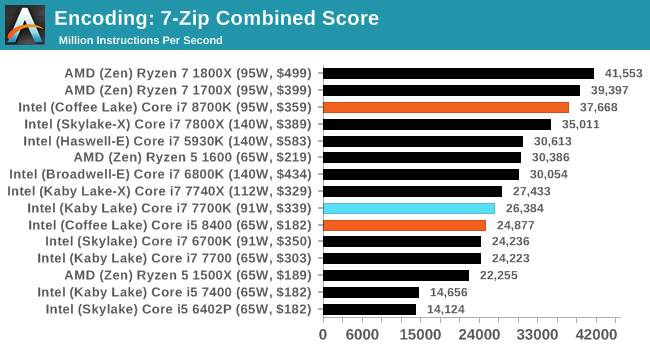
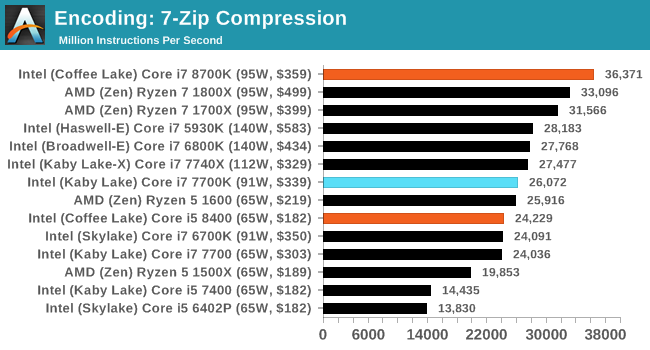
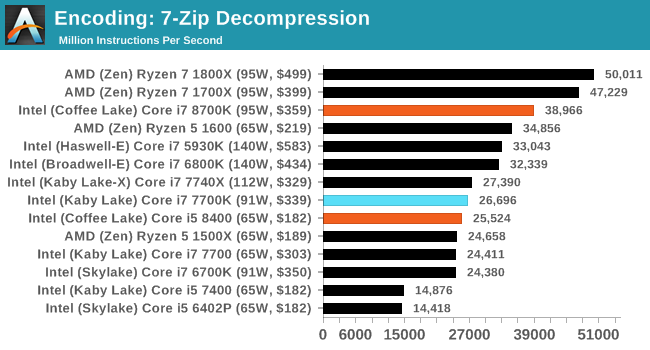
WinRAR 5.40: link
For the 2017 test suite, we move to the latest version of WinRAR in our compression test. WinRAR in some quarters is more user friendly that 7-Zip, hence its inclusion. Rather than use a benchmark mode as we did with 7-Zip, here we take a set of files representative of a generic stack (33 video files in 1.37 GB, 2834 smaller website files in 370 folders in 150 MB) of compressible and incompressible formats. The results shown are the time taken to encode the file. Due to DRAM caching, we run the test 10 times and take the average of the last five runs when the benchmark is in a steady state.
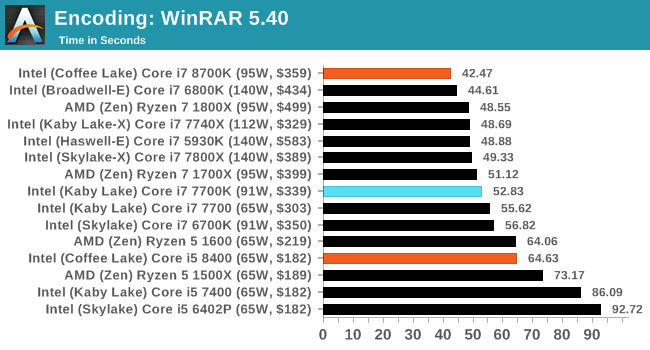
AES Encoding
Algorithms using AES coding have spread far and wide as a ubiquitous tool for encryption. Again, this is another CPU limited test, and modern CPUs have special AES pathways to accelerate their performance. We often see scaling in both frequency and cores with this benchmark. We use the latest version of TrueCrypt and run its benchmark mode over 1GB of in-DRAM data. Results shown are the GB/s average of encryption and decryption.
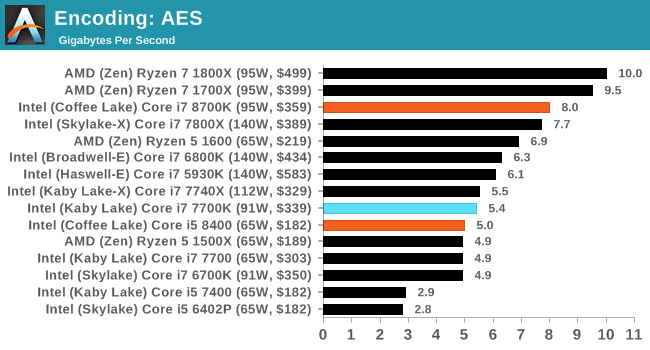
HandBrake v1.0.2 H264 and HEVC: link
As mentioned above, video transcoding (both encode and decode) is a hot topic in performance metrics as more and more content is being created. First consideration is the standard in which the video is encoded, which can be lossless or lossy, trade performance for file-size, trade quality for file-size, or all of the above can increase encoding rates to help accelerate decoding rates. Alongside Google's favorite codec, VP9, there are two others that are taking hold: H264, the older codec, is practically everywhere and is designed to be optimized for 1080p video, and HEVC (or H265) that is aimed to provide the same quality as H264 but at a lower file-size (or better quality for the same size). HEVC is important as 4K is streamed over the air, meaning less bits need to be transferred for the same quality content.
Handbrake is a favored tool for transcoding, and so our test regime takes care of three areas.
Low Quality/Resolution H264: Here we transcode a 640x266 H264 rip of a 2 hour film, and change the encoding from Main profile to High profile, using the very-fast preset.
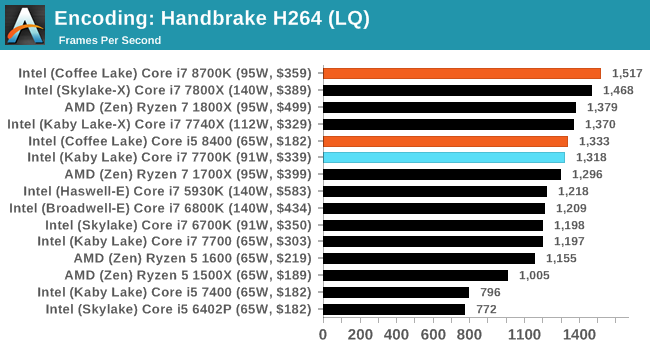
High Quality/Resolution H264: A similar test, but this time we take a ten-minute double 4K (3840x4320) file running at 60 Hz and transcode from Main to High, using the very-fast preset.
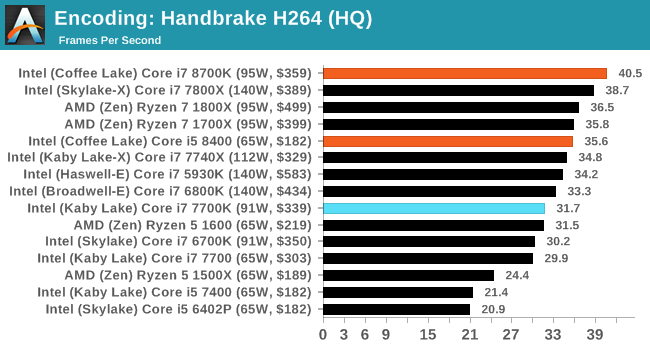
HEVC Test: Using the same video in HQ, we change the resolution and codec of the original video from 4K60 in H264 into 4K60 HEVC.
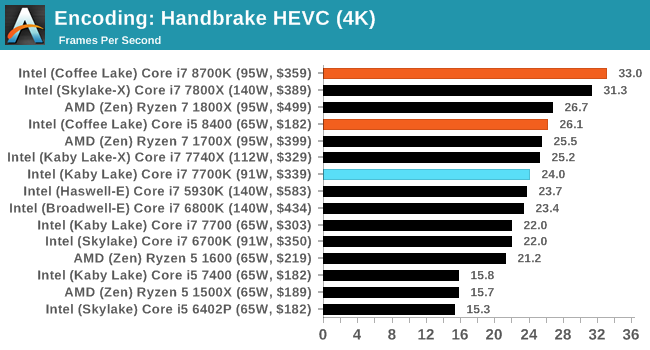










222 Comments
View All Comments
Koenig168 - Friday, October 6, 2017 - link
Hmm ... rather disappointing that Anandtech did not include Ryzen 1600/X until called out by astute readers.mkaibear - Friday, October 6, 2017 - link
...apart from including all the data in their benchmark tool, which they make freely available, you mean? They put in the CPUs they felt that were most relevant. The readership disagreed, so they changed it from their benchmark database. That level of service is almost unheard of in the industry and all you can do is complain. Bravo.Koenig168 - Friday, October 6, 2017 - link
Irrelevant. While I agree with most of what you said, that does not change the fact that Anandtech did not include Ryzen 1600/X until called out by astute readers. To make things a little clearer for you, the i7-8700 is a 6C/12T processor. The Ryzen 1600 is a 6C/12T processor. Therefore, a comparison with the Ryzen 1600 is relevant.You should have addressed the point I made. Instead all you can do is complain about my post. Bravo. (In case this goes over your head again, that last bit is added just to illustrate how pointless such comments are.)
mkaibear - Saturday, October 7, 2017 - link
So your point is, in essence, "they didn't do what I wanted them to do so they're damned for all time".They put up the comparison they felt was relevant, then someone asked them to include something different - so they did it. They listened to their readers and made changes to an article to fix it.
Should they have put the R5 in the original comparison? Possibly. I can see arguments either way but if pushed I'd have said they should have done - but since even the 1600X gets beaten by the 8400 in virtually every benchmark on their list (as per https://www.anandtech.com/bench/product/2018?vs=20... they would then have been accused by the lurking AMD fanboys of having picked comparisons to make AMD look bad (like on every other article where AMD gets beaten in performance).
So what are you actually upset about? That they made an editorial decision you disagree with? You can't accuse them of hiding data since they make it publicly accessible. You can't accuse them of not listening to the readers because they made the change when asked to. Where's the issue here?
mkaibear - Saturday, October 7, 2017 - link
OK on further reading it's not "virtually every" benchmark on the list, just more than half. It's 50% i5 win, 37% R5 win, 12% tied. So not exactly a resounding triumph for the Ryzen but not as bad as I made it out to be.In the UK the price differential is about £12 in favour of the i5, although the motherboard is about £30 more expensive (though of course Z370 is a lot more fully featured than B650) so I think pricing wise it's probably a wash - but if you want gaming performance on anything except Civ VI then you'd be better off getting the i5.
...oh and if you don't want gaming performance then you'll need to buy a discrete graphics card with the R5 which probably means the platform costs are skewed in favour of Intel a bit (£25 for a GF210, £32 for a R5 230...)
watzupken - Saturday, October 7, 2017 - link
As mentioned when I first called out this omission, I would think comparing a 6 vs 4 core irrelevant. This is what AnandTech recommended to lookout for on page 4 "Core Wars": Core i5-8400 vs Ryzen 5 1500X.You be the judge if this makes sense when there is a far better competition/ comparison between the i5 8400 vs R5 1600. Only when you go reading around and you realized that hey, the i5 8400 seems to be losing in some areas to the 1600. I give AnandTech the benefit of the doubt, so I am done debating what is relevant or not.
KAlmquist - Friday, October 6, 2017 - link
The Anandtech benchmark tool confirms what Ryan indicated in the introduction: the i7-8700k wins against the 1600X across the board, due faster clocks and better IPC. The comparison to the i5-8400 is more interesting. It either beats the 1600X by a hair, or loses rather badly. I think the issue is the lack of hyperthreading on the i5-8400 makes the 1600X the better all-around performer. But if you mostly run software that can't take advantage of more than 6 threads, then the i5-8400 looks very good.Personally, I wouldn't buy i5-8400 just because of the socket issue. Coffee Lake is basically just a port of Skylake to a new process, but Intel still came out with a new socket for it. Since I don't want to dump my motherboard in a landfill every time I upgrade my CPU, Intel needs a significantly superior processor (like they had when they were competing against AMD's bulldozer derivatives) to convince me to buy from them.
GreenMeters - Friday, October 6, 2017 - link
So Intel still isn't getting their head out of their rear and offering the option of a CPU that trades all the integrated GPU space for additional cores? Moronic.mkaibear - Friday, October 6, 2017 - link
Integrated graphics make up more than 70% of the desktop market. It's even greater than that for laptops. Why would they sacrifice their huge share of that 70% in order to gain a small share of the 30%? *that* would be moronic.In the meantime you can know that if you buy a desktop CPU from Intel it will have an integrated GPU which works even with no discrete graphics card, and if you need one without the integrated graphics you can go HEDT.
Besides, the limit for Intel isn't remotely "additional space", they've got more than enough space for 8/10/12 CPU cores - it's thermal. Having an integrated GPU which is unused doesn't affect that at all - or arguably it gives more of a thermal sink but I suspect in truth that's a wash.
Zingam - Saturday, October 7, 2017 - link
We need a completely new PC architecture - you need more CPU cores - add more CPU cores, you need more GPU cores add more GPU cores, all of them connected via some sort of Infinity fabric like bus and sharing a single RAM. That should be possible to implement. Instead of innovating Intel is stuck in the current 80s architecture introduced by IBM.